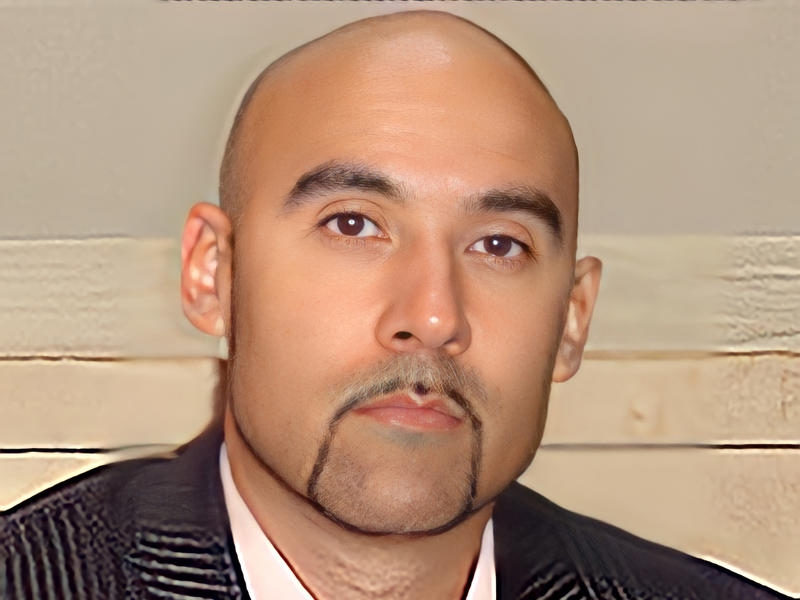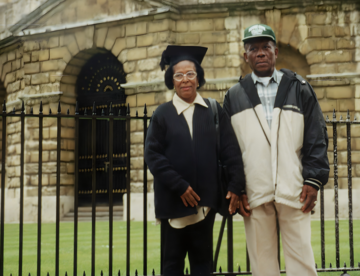LINDSAY JOHNS

LINDSAY JOHNS
Lindsay Johns (Lincoln, 1994) is a successful writer and broadcaster who has carved out a reputation for making ‘erudite but accessible’ radio and TV arts documentaries
Published: 11 April 2023
Author: Richard Lofthouse
Share this article
Lindsay met QUAD at Tate Britain. The first thing he refers to is how he relishes his ability to join up the traditional Western canon – ‘dead white men’ as he often refers to it, with contemporary black literary titans many people will be less familiar with.
In his capacity as a volunteer mentor, he spoke at the 2013 Conservative Party Conference, setting out his stall around the need to broaden the intellectual and cultural horizons of inner-city youths, such as those he has worked with at Leaders of Tomorrow in Peckham, South London since 2005.

Appealing to the then Secretary of State for Education Michael Gove (LMH, 1985), Johns spoke about the need for young people in the inner-cities to ‘confound, not conform to stereotypes’, insisting that the ‘relevance cult’ was not legitimate if it involved reducing Shakespeare - the cultural patrimony of all mankind - to inchoate street talk. He spoke further about ‘eradicating the poverty of aspiration,’ and stating that he was ‘anti-victimhood.’
So alongside Horace, Dante and Shakespeare, he points out the importance of Capetonian novelist Alex La Guma (aka the ‘Black Dickens’), Martinican revolutionary philosopher Frantz Fanon, and Coloured South African poet Arthur Nortje (Jesus,1965).
A Londoner, Johns also has deep family ties with South Africa, and affinities with Martinique (in the French Caribbean) and New York City. His father is from Cape Town and he has other family there, while aged 17 he happened to meet in a Paris Metro station a future great friend, Jean-Claude, the son of Martinican military veteran Clément Olympe Lavanne (1926-2020), subsequently known to Lindsay simply as ‘Papi’ (shown left, as a young man). He looks back on this serendipitous encounter as a 'Baudelairean collision of anonymous destinies', citing the great 19th century French poet on the day we meet.
So powerful was this particular connection that Lindsay subsequently spent his year abroad (he studied French and Italian at Oxford) in Martinique, living with Clément and his wife Paulette, while teaching English in a local school and learning and speaking French Creole.
‘I loved it so much, there was a part of me that didn’t want to come back,’ he recounts.
Lindsay explains that the designation ‘Coloured’ is not pejorative in South Africa, but rather a descriptive term for Cape Town’s Creole community of brown-skinned, Black South Africans, originally descended from the indigenous Khoi and the San tribes, as well as from the Dutch colonisers, Malay indentured labourers, West African and Madagascan slaves and even Caribbean sailors, who as a racial group were ‘ethnically cleansed’ from Cape Town’s city centre during apartheid and banished to the shanty towns of the Cape Flats in the 1960s, where immense poverty still prevails to this day.
The term ‘Coloured’ is nuanced, he explains, and is also undergoing a proud reclamation of its dignity which Lindsay is an active participant in.
In particular, Lindsay has championed Coloured Capetonian novelist and freedom fighter Alex La Guma (1925-1985), author of many works of fiction, but in particular A Walk in the Night (1962) and And A Threefold Cord (1964), dubbing him ‘the Black Dickens’ and making a BBC radio documentary about him in 2018.
‘He was primarily neglected because he was coloured, both by the racist Afrikaaner regime during apartheid and now post-apartheid by the pro-African ANC government,’ says Lindsay, who has given talks on La Guma at both Harvard and Yale universities in recent years and is keen to proselytise his literary genius far and wide.
Positioning himself at the intersection of ‘arts and race,’ Johns moves to discuss a current effort by Capetonian hip-hop activist Emile YX’s Heal the Hood foundation and academics from the University of the Western Cape to reclaim the dignity and ownership of Afri-Kaaps, a language previously associated with white, colonialist Afrikaans speakers, but whose real roots lie with Cape Town’s indigenous populations, the majority of whom are coloured - and the subject of his forthcoming documentary on BBC Radio 4.
Since 2014, Lindsay has also worked on various fund-raising initiatives with a school in one of the most impoverished Coloured townships – Wesbank - and is currently co-sponsoring a Wesbank student to attend a private school.
Lindsay speaks eloquently about how important humanism is to him and movingly explains the gargantuan influence French writer Albert Camus and his allegorical novel La Peste had on him: ‘We are all in the same boat; we must help each other,’ he says, quoting a line from the 1947 novel about human solidarity in the face of adversity and oppression which has become a bedrock of his own life philosophy.
As such, and moving to a different, medical sphere, he’s made a special effort to become a platelet donor, because it actively helps save human lives.
‘You sit there and the machine takes your blood, harvesting platelets that are of particular value to patients who are undergoing chemotherapy, and it then returns your blood to you.’
He’s been a regular blood donor since 2001, a regular platelet donor since 2007 and was recently recognised by the NHS as the UK’s 'most prolific donor' in 2022, having donated every fortnight for a whole year.
Lindsay is very vocal about the need for nuance. As a dedicated mentor in his spare time to young people from a variety of backgrounds, he explains how he has just helped mentor a talented upper-middle class student through Oxford; more normally, he’s been helping equally talented working-class teenagers in Peckham to raise their intellectual aspirations, fulfil their academic potential and win scholarships to Westminster School and places at Oxford.
On the same score, and as someone who proudly refers to himself as Coloured (South African usage), he insists, ‘blackness - like life - is not monolithic, but nuanced, heterogeneous and kaleidoscopic.’ It’s a conception of blackness which is the subject of Lindsay’s latest BBC radio documentary - Harlem Renaissance novelist and polymath Rudolph Fisher (1897-1934).
Johns is also vocal about the need to give back to society.
‘As a result of my parents’ myriad sacrifices, I was fortunate to win the great educational lottery of life: I got into Oxford. But it’s actually far more about the follow-through. What are you going to do with it? How are you going to use this Rolls Royce education to help others and ameliorate the world?’

One of the things he is doing in 2023 is endowing a Francophone literature prize at Oxford in memory of Clément Lavanne, who visited Oxford with his wife Paulette in 1999 and met Lindsay’s former tutor at Lincoln, Dr Ted Nye (left).
Lindsay says that Clément was like a second father to him and one of the few people in his life to ever show him unconditional love.
Clément was also a contemporary of the Martinican psychiatrist and revolutionary philosopher Frantz Fanon (1925-1961), and Lindsay likes to draw parallels between the two men, so different yet in other ways so similar.
A decorated French army veteran like Fanon, ‘Clément Olympe Lavanne was also a proud Martinican, and his life was full of Fanonian paradoxes - a black man fighting for colonial France in an age of trenchantly anti-colonial thinking.’
‘The psychological scars of racial oppression, exploitation and self-hate engendered by French colonialism - which Fanon magisterially articulated - were all known to Clément, since he had not only seen France’s pernicious 'mission civilisatrice' up close, but had lived it.’
As such, Lindsay explains, there is a particular purpose to the prize, beyond encouraging existing and future students at Oxford to not let their flourishing be stymied by their circumstances, since Clément rose from rural poverty in 1930s Martinique to have a distinguished military career which took him across the world.
‘The Clément Olympe Lavanne Prize is also intended to engender an awareness of - and a sensitivity to - the colonial and post-colonial plight of the inhabitants of the French Caribbean islands of Martinique and Guadeloupe’, he says.
Reflecting on his time at Oxford between 1994 and 1998, Lindsay says,
‘My advice for students considering an application to Oxford is to study the subject that you are genuinely passionate about and which intellectually excites you'. As for careers afterwards, he is adamant, 'Irrespective of your racial or social background, dare to dream big, find out what you love doing and what you would willingly do for free, then just work out how to get paid for it. At Oxford, I learnt the value of knowing my own mind, how to be my own man and that it’s OK to be different.’
Lindsay Johns (Lincoln, 1994) has written for many publications, including the Evening Standard, The Times, The Daily Telegraph, The Spectator, The TLS, Prospect and The Oldie. He used to present on BBC 2’s The Culture Show, and now writes and presents arts documentaries for BBC radio and TV. He is currently a (non-residential) Fellow at the Hutchins Center for African and African-American Research at Harvard University.
X -Ray Vision: Rudolf Fisher in Harlem is available on BBC Sounds: https://www.bbc.co.uk/programmes/m001k184
Alex La Guma: The Black Dickens is available on BBC Sounds: https://www.bbc.co.uk/programmes/b09qcyy0
Lindsay’s doc on Kaaps - Speaking For Themselves - will be broadcast on BBC Radio 4 and World Service later on this summer, and then available on BBC Sounds: https://www.bbc.co.uk/programmes/w3ct4m77
The Clément Olympe Lavanne Prize will be awarded for the first time in July 2023.















